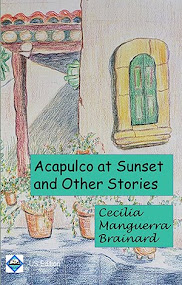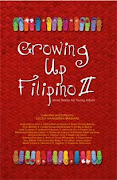I'm leaving for Manila tomorrow and so my mind is full of Manila-thoughts. Here's a short story I wrote that's set in Manila, and which is part of my short story collection, Acapulco At Sunset and Other Stories (Kindle, Nook, Anvil). The story is fiction.
AFTER a quarter of a century of living in America, I have turned into some kind of bird, a sparrow perhaps, returning to where I come from, once a year. One of the so-called "balikbayans" (which some people say with a sneer). Indeed we have become strange creatures, we balikbayans, not quite Filipino, not quite American. And still I do my annual trek, as if searching for something, what exactly I do not know, cannot pinpoint why exactly I return. I say it's to visit my mother. I say it's to visit my roots. But it's something else, something vital to my soul. Is it something from my past? Perhaps. So much of the present is linked to the past. Therefore this year, like the year before, and the year before that, I shut down my studio, say goodbye to my agent, and endure the 25-some hour flight from New York to Manila. And this year, I say the weather isn't too bad although Manila is getting smoggy. And my mother says it's the lahar, it has been such since Mt. Pinatubo exploded in 1991, the lahar, diverting rivers, drowning towns, filling the air with blackness that we inhale, that my mother inhales and which sends her and many others in Manila into coughing spells. Bronchitis and asthma, ordinary day-to-day illnesses, this is Manila now unlike the Manila that I knew in the 60s, long stretches of fields between Malate and Quezon City, stretches of nothingness, a canopy of blue sky, now there are houses and buildings, and traffic that can try a saint. Manila.
My school friends still remember me. Tess, especially, who was my best friend in high school, and who has remained a special friend always. "You must come to dinner. It's for the February celebrants," she insists. In their middle-age, my Theresian classmates have bonded and hold monthly dinners for their birthday celebrants. "It'll be at the clubhouse at my apartment. And we'll have a program, poetry reading! Bring your favorite poem to share. And you must tell us about your recent show. I heard it was a success."
Tess lives in Pacific Plaza, where Imelda Marcos has moved in recently; and when I arrive the women are huddled gossiping about the former first lady-something about Imelda forgetting to pay her phone bill and PLDT cutting her line. Twenty women whom I barely recognize, laughing giddily as if it's 1964 again, young 16 year olds, giggling without any care. A memory comes to me-our high school graduation night. After the ceremony, we returned to our classroom to gather our things for the last time. Someone started sobbing (was it Verna?), and a spell was cast, and all of us sat still and began crying, for no specific reason at all, just some vague sadness at the recognition that a chapter of our lives had ended, and that there was something out there for us, what exactly we didn't know.
Sister Agnes is present, a treat I understand because she doesn't usually attend these gatherings. There she sits looking very much like Sister Agnes of the past, large eyes with a startled expression, that tentative smile, that low clear voice recounting details about all of us. How does she do it? She must have had thousands of students, and still she remembers my Hong Kong-bought black shoes with Cuban heels, and she recounts with a laugh how much Tess loved cucumbers in her sandwiches. When we were freshmen in high school, Sister Agnes frightened us so much, we'd jump when she walked up to us. She was known as the terror. But she became our teacher in our Junior year, and even though she was strict, she loved us. We "belonged to her" and she tolerated our foibles. Once, standing in line for a long time; Tess and I became bored and we left the line to peer down some pipe. There was nothing there really, just a pipe shoved down the earth; and there we stood, with a vacuous expression, staring at the pipe and earth. Sister Agnes approached us; we jumped, ready to be punished. Instead she stared at the pipe and earth and declared, "Well, there's nothing there. Get back in line."
They ask how I'm doing; they say they've been reading about me, that they're proud of me, so glad that I've "mainstreamed," one of few Filipino artists who have done so in the States. I smile, answer their questions, but do not go on and on about my work. It's taken me over two decades to learn my art, to make a name, to build a reputation-how can I sum up what I've done in a few minutes? How can they truly know the difficulties I've faced as a so-called "minority woman" in White America? How can they understand how much I put into my art, that it must be more than good, that it must stand out? How can they know the politics involved, the networking to gain whatever edge I can? How can they know the dry spells, the times when there's nothing, nothing worthwhile coming out on the canvas, and the panic I feel over this aridity? I smile, say things are just fine, that yes, my recent show went well, and yes I'll do one in Manila soon, perhaps at the Manila PEN. I avoid revealing to them the private details of my life-that I have no children, that in fact my husband left me because I did not want to have a child. Details-mundane, painful-that add another texture to the picture I have created of myself these years.
After the explosion of greetings and remembrances, we settle down to chat and eat. I'm in a table with Araceli, Darn, Carol, Aida, Henedina, old friends, so we have an easy time catching up. Tess is in her element, flitting about, playing hostess. After dinner, she emcees the program. She cajoles everyone to get up to read a poem or recall favorite stanzas. Everyone hams it up in front of the mike, even shy Monina dares to read a poem. It's as if Sister Agnes's presence validates our youth-if she's around, surely we couldn't be that old? Silly young girls this balmy February night.
When the poetry reading disintegrates to nursery rhymes, Tess recovers the mike to read a poem by Maya Angelou. Her voice is soft and seductive like the night outside:
She pauses (as we all feel a
pause in our hearts); then she invites others to continue the program. But we've
run out of poems. Everyone who has brought a poem has shared it, and there is
a lull in the program. The mike is passed around like a hot potato-here Carol,
you emcee, no, you do it Araceli, no you do it.
Sister Agnes gets up, takes the mike from Tess's hands and says: I would like to say something.
A shadow flits across her face, and briefly I wonder if we forgot to say our prayers before eating. Sister says, "Tess's reading of "The Caged Bird" has reminded me of someone close to my heart, to our hearts. There is one of you who is not present here, and I want to remember her."
I know whom she is talking about-Verna. Verna, the other class artist aside from myself. Verna who did vivid water colors and oils that brought me to rain forests and the Cordilleras. Soft-spoken Verna, who unlike the other "artsy" ones in class, was most conservative in appearance. We dared wear clunky boys' shoes, she wore dainty black shoes that looked like ballet shoes. As the class artists, she and I were often pitted against each other. In our junior year there was an art contest and she and I knew we were the only serious candidates. I won the P200 price; and I was afraid that she would stay away from me. But no, when the winner was announced, Verna was the first to congratulate me. We became friends, meeting during recess and for lunch.
Verna talked me into joining the Solidality, and Sister Agnes got us started on visiting the sick at Philippine General Hospital. The very first time we went, we ran across a nurse carrying a basin filled with blood. I almost threw up. I hated that hospital, hated the indigent patients who clung to us with a desperation that took days to wash away from my skin, my soul. Verna did not mind talking to the patients, consoling them, giving them hope. "They're poor," she explained, as if I were unaware of that fact.
Verna fell in love with a boy of eight with kidney problems. Every Saturday, we visited the hospital, and she saw that boy. She brought him little gifts, toys and candies. He lit up when he saw her walking toward his bed. There was something I did not approve about that relationship, something that disturbed me. "He really likes you," I said, in a tone that was more reprimanding than I had wanted it to be.
"I like him too," she replied.
"But is that all right? Is it really all right for us to like these patients? We won't be members of the Solidality forever and then we won't be back, and then what will happen to them? We can't be friends with them, have them expect things from us, then abandon them?"
"They'll go on without us."
She said this so calmly, it infuriated me. Verna had a way of being self-righteous sometimes. She had a way of knowing black from white; whereas I always had too many gray areas in my life. Even now, there are a lot of gray areas in my life.
One Saturday--it was March, almost the end of the school year--we visited the hospital. I was edgy because I figured it was time for Verna to say goodbye to the child, to explain to him that finals were coming and summer vacation would soon be here, that we would not be back to see him. "You must tell him, Verna, otherwise, he'll go on waiting for you."
"Don't worry," she said.
When we entered the children's ward, his empty bed loomed in front of us. Verna and I glanced at each other. Without being told, we knew. The dayshift nurse confirmed that the boy was dead. All we could do was walk to the chapel and pray. Verna cried. I cried with her, but inside I felt that I had been right after all, that she shouldn't have gotten involved with that child. I picked up the idea then that relationships need to be measured in terms of the toll on one's self or one's goals. I don't believe Verna learned that lesson.
Sister Agnes's voice brings me back to the the clubhouse, to the present. "Do you know what happened to Verna?" she is asking.
We nod. Someone says, "She died in a car accident."
Tess wrote me about Verna's car accident in Mindanao. I'd just finished a huge painting of a "Mother and Child," in an Ifugao motif. I knew it was excellent, and I was feeling fuzzy the way I do when I create something really fine. The mailman came, and I spotted Tess's handwriting on an envelope. I opened her letter and found out about Verna. It was strange, but one of the first emotions that went through me was resentment that Verna had never even dropped me a postcard.
"There's more to the story than that," Sister continues.
"What?" we ask. What more could there have been except for the fact that Verna died at 30?
"After graduation, Verna continued to visit me," Sister Agnes said. "She went to art school and I even helped get her a teaching position. She was an excellent art teacher. Things were going just fine for Verna until she met a man named Hector. Verna's greatest mistake, in my opinion, was falling in love with Hector. The political situation was very bad at that time, and Hector was an activist. Verna followed him wherever he went. I saw them in Negros where they were conducting teach-ins for farmers. You recall that land reform was a big issue then. Verna and Hector were against the Marcos government and were deeply involved with the more radical political elements.
"In Negros, Verna told me that she loved Hector and would marry him. I wondered about this because I noticed another young woman who kept following Hector around. It was clear, at least to me, that Hector was keeping both Verna and this woman in tow. But Verna loved him too much and either ignored the situation, or believed that Hector's infatuation over the woman would pass.
"Apparently, Hector's affection for the other woman did not fade because even when he and Verna were married, this woman continued to hang around them. This hurt Verna of course, and she mentioned this to me during her visits. But she could not leave him. That's what she said to me, 'I can't leave him. I love him.' By this time, she had given up her art. She was fully devoted to Hector and his causes.
"When the Marcos government started cracking down on anti-government elements, Hector and Verna went underground. I didn't hear from her for several years, but one day, Verna, with a baby in her arms, came to see me. She said she, Hector, and their baby would be leaving soon for the States, that things would be better, that they could work for the people over there. The baby was beautiful, clear-skinned with slanted eyes, like Verna's. There was one brief reference of that woman friend of Hector. Verna said it calmy, but I could imagine her pain over the situation. It seemed to me that all she wanted was a quiet life with Hector and their child. For years, she and Hector had lived a harsh life, hiding from the government, working for what they believed was good for the people. So you see, in many ways, Verna was a caged bird.
"Well, you know how the story ends. One day, Hector, Verna, and their baby were in a car, near Davao. The military ambushed them; Verna was killed. Hector and the baby escaped. Why only Verna died, I'll never understand. A part of me says that she died because she wanted to die. Maybe loving Hector was too much for her. That was her biggest mistake, you know, loving that man.
"So now, since we are gathered here, let us remember Verna for just a moment and pray for the eternal repose of her soul."
After saying prayers for the dead, we mumble to one another surprise at Sister Agnes's story. None of us knew about Hector; none of us knew about the other woman; none of us knew about the ambush.
I am left with emotions so turbulent, I do not know where to begin to sort them out. I feel guilty that Verna is dead while I survived and am an artist with some measure of success. But at the same time I envy her political involvement and nobility to the end. I was not even in the Philippines when things were bad, when people like Verna were getting killed; I was in New York, making compromises to get where I am now. Again that huge expanse of gray in my life, while Verna knew what black was and what white was. I look at my life and my accomplishments and the price I've had to pay for all this; and I look at Verna's brief life; and I wonder who of us won this time. That art contest in high school-how simple it had been to win that P200. It has never been as simple ever again. Never. A sadness starts to gnaw inside me and will not leave. A pain that probably has been there for so many years I do not when it began.
When the others leave and only five of us remain, we ascend to Tess's apartment on the 40th floor. It is a magnificent apartment, surrounded by picture windows that make you feel as if you're floating on top of Manila. We immediately gravitate to the enormous picture window in the living room that reveal to us Manila as we have never seen it before-a sprawling metropolis, a-glitter with multicolored lights. It's like staring at Hong Kong from Victoria's Peak at night. How glamorous Manila looks. Even with its smog, its poverty, its traffic, its turbulent history, Manila lays before me like a mysterious and beautiful woman. Manila moves me.
I can feel a stirring in me, an urge to capture this picture on canvas; (and always with that creative urge is a sense of excitement, of life.) It will be more than the sprawling city scene before me. The challenge as I see it will be to capture the evening on my canvas, maybe capture my sadness, maybe even capture Verna there.
I will call my creation: "Manila Without Verna."
MANILA WITHOUT
VERNA
by Cecilia Manguerra Brainard
by Cecilia Manguerra Brainard
AFTER a quarter of a century of living in America, I have turned into some kind of bird, a sparrow perhaps, returning to where I come from, once a year. One of the so-called "balikbayans" (which some people say with a sneer). Indeed we have become strange creatures, we balikbayans, not quite Filipino, not quite American. And still I do my annual trek, as if searching for something, what exactly I do not know, cannot pinpoint why exactly I return. I say it's to visit my mother. I say it's to visit my roots. But it's something else, something vital to my soul. Is it something from my past? Perhaps. So much of the present is linked to the past. Therefore this year, like the year before, and the year before that, I shut down my studio, say goodbye to my agent, and endure the 25-some hour flight from New York to Manila. And this year, I say the weather isn't too bad although Manila is getting smoggy. And my mother says it's the lahar, it has been such since Mt. Pinatubo exploded in 1991, the lahar, diverting rivers, drowning towns, filling the air with blackness that we inhale, that my mother inhales and which sends her and many others in Manila into coughing spells. Bronchitis and asthma, ordinary day-to-day illnesses, this is Manila now unlike the Manila that I knew in the 60s, long stretches of fields between Malate and Quezon City, stretches of nothingness, a canopy of blue sky, now there are houses and buildings, and traffic that can try a saint. Manila.
My school friends still remember me. Tess, especially, who was my best friend in high school, and who has remained a special friend always. "You must come to dinner. It's for the February celebrants," she insists. In their middle-age, my Theresian classmates have bonded and hold monthly dinners for their birthday celebrants. "It'll be at the clubhouse at my apartment. And we'll have a program, poetry reading! Bring your favorite poem to share. And you must tell us about your recent show. I heard it was a success."
Tess lives in Pacific Plaza, where Imelda Marcos has moved in recently; and when I arrive the women are huddled gossiping about the former first lady-something about Imelda forgetting to pay her phone bill and PLDT cutting her line. Twenty women whom I barely recognize, laughing giddily as if it's 1964 again, young 16 year olds, giggling without any care. A memory comes to me-our high school graduation night. After the ceremony, we returned to our classroom to gather our things for the last time. Someone started sobbing (was it Verna?), and a spell was cast, and all of us sat still and began crying, for no specific reason at all, just some vague sadness at the recognition that a chapter of our lives had ended, and that there was something out there for us, what exactly we didn't know.
Sister Agnes is present, a treat I understand because she doesn't usually attend these gatherings. There she sits looking very much like Sister Agnes of the past, large eyes with a startled expression, that tentative smile, that low clear voice recounting details about all of us. How does she do it? She must have had thousands of students, and still she remembers my Hong Kong-bought black shoes with Cuban heels, and she recounts with a laugh how much Tess loved cucumbers in her sandwiches. When we were freshmen in high school, Sister Agnes frightened us so much, we'd jump when she walked up to us. She was known as the terror. But she became our teacher in our Junior year, and even though she was strict, she loved us. We "belonged to her" and she tolerated our foibles. Once, standing in line for a long time; Tess and I became bored and we left the line to peer down some pipe. There was nothing there really, just a pipe shoved down the earth; and there we stood, with a vacuous expression, staring at the pipe and earth. Sister Agnes approached us; we jumped, ready to be punished. Instead she stared at the pipe and earth and declared, "Well, there's nothing there. Get back in line."
They ask how I'm doing; they say they've been reading about me, that they're proud of me, so glad that I've "mainstreamed," one of few Filipino artists who have done so in the States. I smile, answer their questions, but do not go on and on about my work. It's taken me over two decades to learn my art, to make a name, to build a reputation-how can I sum up what I've done in a few minutes? How can they truly know the difficulties I've faced as a so-called "minority woman" in White America? How can they understand how much I put into my art, that it must be more than good, that it must stand out? How can they know the politics involved, the networking to gain whatever edge I can? How can they know the dry spells, the times when there's nothing, nothing worthwhile coming out on the canvas, and the panic I feel over this aridity? I smile, say things are just fine, that yes, my recent show went well, and yes I'll do one in Manila soon, perhaps at the Manila PEN. I avoid revealing to them the private details of my life-that I have no children, that in fact my husband left me because I did not want to have a child. Details-mundane, painful-that add another texture to the picture I have created of myself these years.
After the explosion of greetings and remembrances, we settle down to chat and eat. I'm in a table with Araceli, Darn, Carol, Aida, Henedina, old friends, so we have an easy time catching up. Tess is in her element, flitting about, playing hostess. After dinner, she emcees the program. She cajoles everyone to get up to read a poem or recall favorite stanzas. Everyone hams it up in front of the mike, even shy Monina dares to read a poem. It's as if Sister Agnes's presence validates our youth-if she's around, surely we couldn't be that old? Silly young girls this balmy February night.
When the poetry reading disintegrates to nursery rhymes, Tess recovers the mike to read a poem by Maya Angelou. Her voice is soft and seductive like the night outside:
The caged
bird sings
with a fearful
trill
of things
unknown
but longed
for still
and his tune
is heard
on the distant
hill
for the caged
bird
sings of freedom.
Sister Agnes gets up, takes the mike from Tess's hands and says: I would like to say something.
A shadow flits across her face, and briefly I wonder if we forgot to say our prayers before eating. Sister says, "Tess's reading of "The Caged Bird" has reminded me of someone close to my heart, to our hearts. There is one of you who is not present here, and I want to remember her."
I know whom she is talking about-Verna. Verna, the other class artist aside from myself. Verna who did vivid water colors and oils that brought me to rain forests and the Cordilleras. Soft-spoken Verna, who unlike the other "artsy" ones in class, was most conservative in appearance. We dared wear clunky boys' shoes, she wore dainty black shoes that looked like ballet shoes. As the class artists, she and I were often pitted against each other. In our junior year there was an art contest and she and I knew we were the only serious candidates. I won the P200 price; and I was afraid that she would stay away from me. But no, when the winner was announced, Verna was the first to congratulate me. We became friends, meeting during recess and for lunch.
Verna talked me into joining the Solidality, and Sister Agnes got us started on visiting the sick at Philippine General Hospital. The very first time we went, we ran across a nurse carrying a basin filled with blood. I almost threw up. I hated that hospital, hated the indigent patients who clung to us with a desperation that took days to wash away from my skin, my soul. Verna did not mind talking to the patients, consoling them, giving them hope. "They're poor," she explained, as if I were unaware of that fact.
Verna fell in love with a boy of eight with kidney problems. Every Saturday, we visited the hospital, and she saw that boy. She brought him little gifts, toys and candies. He lit up when he saw her walking toward his bed. There was something I did not approve about that relationship, something that disturbed me. "He really likes you," I said, in a tone that was more reprimanding than I had wanted it to be.
"I like him too," she replied.
"But is that all right? Is it really all right for us to like these patients? We won't be members of the Solidality forever and then we won't be back, and then what will happen to them? We can't be friends with them, have them expect things from us, then abandon them?"
"They'll go on without us."
She said this so calmly, it infuriated me. Verna had a way of being self-righteous sometimes. She had a way of knowing black from white; whereas I always had too many gray areas in my life. Even now, there are a lot of gray areas in my life.
One Saturday--it was March, almost the end of the school year--we visited the hospital. I was edgy because I figured it was time for Verna to say goodbye to the child, to explain to him that finals were coming and summer vacation would soon be here, that we would not be back to see him. "You must tell him, Verna, otherwise, he'll go on waiting for you."
"Don't worry," she said.
When we entered the children's ward, his empty bed loomed in front of us. Verna and I glanced at each other. Without being told, we knew. The dayshift nurse confirmed that the boy was dead. All we could do was walk to the chapel and pray. Verna cried. I cried with her, but inside I felt that I had been right after all, that she shouldn't have gotten involved with that child. I picked up the idea then that relationships need to be measured in terms of the toll on one's self or one's goals. I don't believe Verna learned that lesson.
Sister Agnes's voice brings me back to the the clubhouse, to the present. "Do you know what happened to Verna?" she is asking.
We nod. Someone says, "She died in a car accident."
Tess wrote me about Verna's car accident in Mindanao. I'd just finished a huge painting of a "Mother and Child," in an Ifugao motif. I knew it was excellent, and I was feeling fuzzy the way I do when I create something really fine. The mailman came, and I spotted Tess's handwriting on an envelope. I opened her letter and found out about Verna. It was strange, but one of the first emotions that went through me was resentment that Verna had never even dropped me a postcard.
"There's more to the story than that," Sister continues.
"What?" we ask. What more could there have been except for the fact that Verna died at 30?
"After graduation, Verna continued to visit me," Sister Agnes said. "She went to art school and I even helped get her a teaching position. She was an excellent art teacher. Things were going just fine for Verna until she met a man named Hector. Verna's greatest mistake, in my opinion, was falling in love with Hector. The political situation was very bad at that time, and Hector was an activist. Verna followed him wherever he went. I saw them in Negros where they were conducting teach-ins for farmers. You recall that land reform was a big issue then. Verna and Hector were against the Marcos government and were deeply involved with the more radical political elements.
"In Negros, Verna told me that she loved Hector and would marry him. I wondered about this because I noticed another young woman who kept following Hector around. It was clear, at least to me, that Hector was keeping both Verna and this woman in tow. But Verna loved him too much and either ignored the situation, or believed that Hector's infatuation over the woman would pass.
"Apparently, Hector's affection for the other woman did not fade because even when he and Verna were married, this woman continued to hang around them. This hurt Verna of course, and she mentioned this to me during her visits. But she could not leave him. That's what she said to me, 'I can't leave him. I love him.' By this time, she had given up her art. She was fully devoted to Hector and his causes.
"When the Marcos government started cracking down on anti-government elements, Hector and Verna went underground. I didn't hear from her for several years, but one day, Verna, with a baby in her arms, came to see me. She said she, Hector, and their baby would be leaving soon for the States, that things would be better, that they could work for the people over there. The baby was beautiful, clear-skinned with slanted eyes, like Verna's. There was one brief reference of that woman friend of Hector. Verna said it calmy, but I could imagine her pain over the situation. It seemed to me that all she wanted was a quiet life with Hector and their child. For years, she and Hector had lived a harsh life, hiding from the government, working for what they believed was good for the people. So you see, in many ways, Verna was a caged bird.
"Well, you know how the story ends. One day, Hector, Verna, and their baby were in a car, near Davao. The military ambushed them; Verna was killed. Hector and the baby escaped. Why only Verna died, I'll never understand. A part of me says that she died because she wanted to die. Maybe loving Hector was too much for her. That was her biggest mistake, you know, loving that man.
"So now, since we are gathered here, let us remember Verna for just a moment and pray for the eternal repose of her soul."
After saying prayers for the dead, we mumble to one another surprise at Sister Agnes's story. None of us knew about Hector; none of us knew about the other woman; none of us knew about the ambush.
I am left with emotions so turbulent, I do not know where to begin to sort them out. I feel guilty that Verna is dead while I survived and am an artist with some measure of success. But at the same time I envy her political involvement and nobility to the end. I was not even in the Philippines when things were bad, when people like Verna were getting killed; I was in New York, making compromises to get where I am now. Again that huge expanse of gray in my life, while Verna knew what black was and what white was. I look at my life and my accomplishments and the price I've had to pay for all this; and I look at Verna's brief life; and I wonder who of us won this time. That art contest in high school-how simple it had been to win that P200. It has never been as simple ever again. Never. A sadness starts to gnaw inside me and will not leave. A pain that probably has been there for so many years I do not when it began.
When the others leave and only five of us remain, we ascend to Tess's apartment on the 40th floor. It is a magnificent apartment, surrounded by picture windows that make you feel as if you're floating on top of Manila. We immediately gravitate to the enormous picture window in the living room that reveal to us Manila as we have never seen it before-a sprawling metropolis, a-glitter with multicolored lights. It's like staring at Hong Kong from Victoria's Peak at night. How glamorous Manila looks. Even with its smog, its poverty, its traffic, its turbulent history, Manila lays before me like a mysterious and beautiful woman. Manila moves me.
I can feel a stirring in me, an urge to capture this picture on canvas; (and always with that creative urge is a sense of excitement, of life.) It will be more than the sprawling city scene before me. The challenge as I see it will be to capture the evening on my canvas, maybe capture my sadness, maybe even capture Verna there.
I will call my creation: "Manila Without Verna."
real photo: St. Theresa's College High School Class 1964
Read also:
The Turkish Seamstress in Ubec
Flip Gothic
Manila Without Verna
Winning Hearts and Minds
The Black Man in the Forest
The Old Mansion near the Plaza
The Blue-Green Chiffon Dress
~~~
Read also:
The Turkish Seamstress in Ubec
Flip Gothic
Manila Without Verna
Winning Hearts and Minds
The Black Man in the Forest
The Old Mansion near the Plaza
The Blue-Green Chiffon Dress
~~~
tags: fiction, short story, Manila, Philippines, Marcos Dictatorship, Philippine history, Cecilia Brainard






























No comments:
Post a Comment